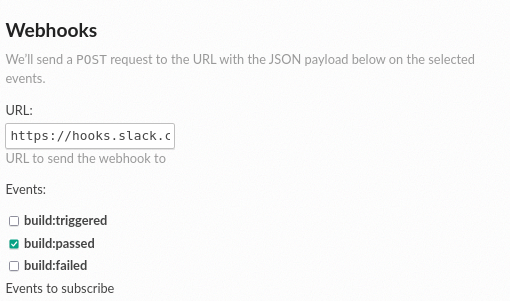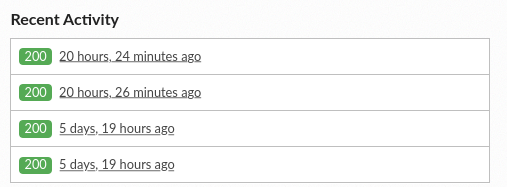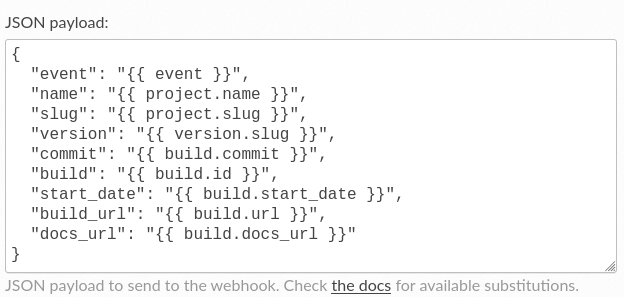How to setup build status webhooks
In this guide, you can learn how to setup build notifications via webhooks.
When a documentation build is triggered, successful or failed, Read the Docs can notify external APIs using webhooks. In that way, you can receive build notifications in your own monitoring channels and be alerted you when your builds fail so you can take immediate action.
See also
- How to setup email notifications
Setup basic email notifications for build failures.
- Pull request previews
Configure automated feedback and documentation site previews for your pull requests.
Build status webhooks
Take these steps to enable build notifications using a webhook:
Go to in your project.
Fill in the URL field and select what events will trigger the webhook
Modify the payload or leave the default (see below)
Click on Save

URL and events for a webhook
Every time one of the checked events triggers, Read the Docs will send a POST request to your webhook URL. The default payload will look like this:
{
"event": "build:triggered",
"name": "docs",
"slug": "docs",
"version": "latest",
"commit": "2552bb609ca46865dc36401dee0b1865a0aee52d",
"build": "15173336",
"start_date": "2021-11-03T16:23:14",
"build_url": "https://readthedocs.org/projects/docs/builds/15173336/",
"docs_url": "https://docs.readthedocs.io/en/latest/"
}
When a webhook is sent, a new entry will be added to the “Recent Activity” table. By clicking on each individual entry, you will see the server response, the webhook request, and the payload.

Activity of a webhook
Note
We don’t trigger webhooks on builds from pull requests.
Custom payload examples
You can customize the payload of the webhook to suit your needs, as long as it is valid JSON. Below you have a couple of examples, and in the following section you will find all the available variables.

Custom payload
{
"attachments": [
{
"color": "#db3238",
"blocks": [
{
"type": "section",
"text": {
"type": "mrkdwn",
"text": "*Read the Docs build failed*"
}
},
{
"type": "section",
"fields": [
{
"type": "mrkdwn",
"text": "*Project*: <{{ project.url }}|{{ project.name }}>"
},
{
"type": "mrkdwn",
"text": "*Version*: {{ version.name }} ({{ build.commit }})"
},
{
"type": "mrkdwn",
"text": "*Build*: <{{ build.url }}|{{ build.id }}>"
}
]
}
]
}
]
}
More information on the Slack Incoming Webhooks documentation.
{
"username": "Read the Docs",
"content": "Read the Docs build failed",
"embeds": [
{
"title": "Build logs",
"url": "{{ build.url }}",
"color": 15258703,
"fields": [
{
"name": "*Project*",
"value": "{{ project.url }}",
"inline": true
},
{
"name": "*Version*",
"value": "{{ version.name }} ({{ build.commit }})",
"inline": true
},
{
"name": "*Build*",
"value": "{{ build.url }}"
}
]
}
]
}
More information on the Discord webhooks documentation.
Variable substitutions reference
{{ event }}Event that triggered the webhook, one of
build:triggered,build:failed, orbuild:passed.{{ build.id }}Build ID.
{{ build.commit }}Commit corresponding to the build, if present (otherwise
"").{{ build.url }}URL of the build, for example
https://readthedocs.org/projects/docs/builds/15173336/.{{ build.docs_url }}URL of the documentation corresponding to the build, for example
https://docs.readthedocs.io/en/latest/.{{ build.start_date }}Start date of the build (UTC, ISO format), for example
2021-11-03T16:23:14.{{ organization.name }}Organization name (Commercial only).
{{ organization.slug }}Organization slug (Commercial only).
{{ project.slug }}Project slug.
{{ project.name }}Project name.
{{ project.url }}URL of the project dashboard.
{{ version.slug }}Version slug.
{{ version.name }}Version name.
Validating the payload
After you add a new webhook, Read the Docs will generate a secret key for it
and uses it to generate a hash signature (HMAC-SHA256) for each payload
that is included in the X-Hub-Signature header of the request.

Webhook secret
We highly recommend using this signature to verify that the webhook is coming from Read the Docs. To do so, you can add some custom code on your server, like this:
import hashlib
import hmac
import os
def verify_signature(payload, request_headers):
"""
Verify that the signature of payload is the same as the one coming from request_headers.
"""
digest = hmac.new(
key=os.environ["WEBHOOK_SECRET"].encode(),
msg=payload.encode(),
digestmod=hashlib.sha256,
)
expected_signature = digest.hexdigest()
return hmac.compare_digest(
request_headers["X-Hub-Signature"].encode(),
expected_signature.encode(),
)
Legacy webhooks
Webhooks created before the custom payloads functionality was added to Read the Docs send a payload with the following structure:
{
"name": "Read the Docs",
"slug": "rtd",
"build": {
"id": 6321373,
"commit": "e8dd17a3f1627dd206d721e4be08ae6766fda40",
"state": "finished",
"success": false,
"date": "2017-02-15 20:35:54"
}
}
To migrate to the new webhooks and keep a similar structure, you can use this payload:
{
"name": "{{ project.name }}",
"slug": "{{ project.slug }}",
"build": {
"id": "{{ build.id }}",
"commit": "{{ build.commit }}",
"state": "{{ event }}",
"date": "{{ build.start_date }}"
}
}
Troubleshooting webhooks and payload discovery
You can use public tools to discover, inspect and test webhook integration. These tools act as catch-all endpoints for HTTP requests and respond with a 200 OK HTTP status code. You can use these payloads to develop your webhook services. You should exercise caution when using these tools as you might be sending sensitive data to external tools.
These public tools include:
Beeceptor to create a temporary HTTPS endpoint and inspect incoming payloads. It lets you respond custom response code or messages from named HTTP mock server.
Webhook Tester to inspect and debug incoming payloads. It lets you inspect all incoming requests to it’s URL/bucket.